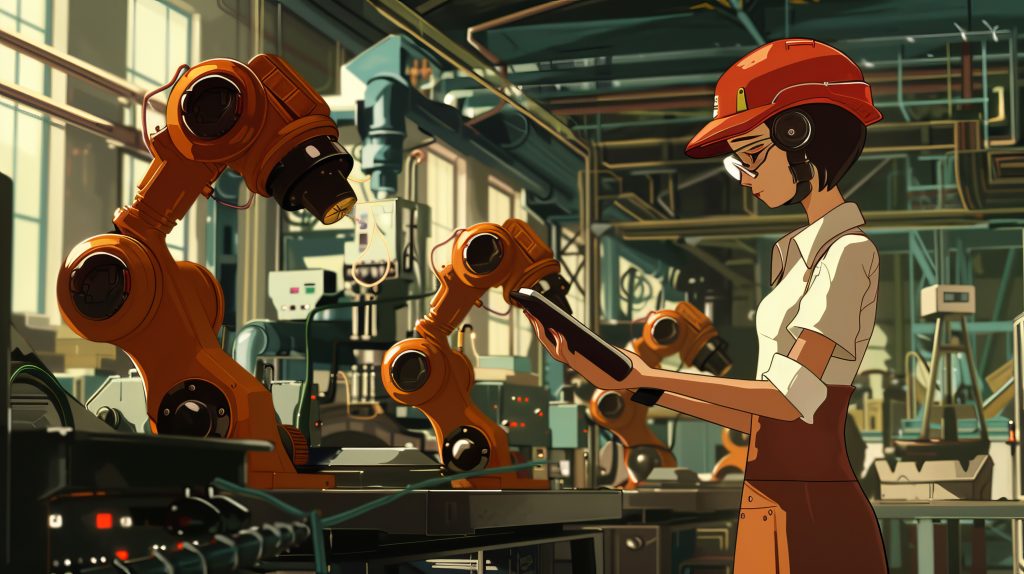The manufacturing industry is witnessing a seismic shift, driven by the integration of advanced technologies such as Generative Artificial Intelligence (AI). This technology is not merely a tool for improvement but a transformative force redefining the scope of production capabilities, efficiency, and innovation. The statistical impact of Generative AI on manufacturing growth is both profound and quantifiable, indicating significant advancements in sector efficiency:
- Increased Productivity: McKinsey reports that companies integrating AI into their manufacturing processes have seen productivity improvements ranging from 30% to 50%.
- Cost Reduction: According to IBM, AI applications in manufacturing have led to reductions in design costs by up to 75% and production costs by as much as 40%.
- Revenue Growth: Firms leveraging AI in their manufacturing operations report up to a 50% increase in new product success rates, which contributes to higher revenue growth from these new offerings.
These metrics underscore the substantial role that Generative AI plays in enhancing manufacturing outcomes, making it a cornerstone of modern industrial strategies.
The Role of Generative AI in Manufacturing
Innovating Product Design
The product design process has been radically transformed by Generative AI. Traditionally, product design was a linear and iterative process that required extensive time and resources to move from concept to prototype, with designers manually sketching ideas, creating models, and testing prototypes. This process could take several months to years depending on the complexity of the product.
However, with the advent of Generative AI, the design process has become highly dynamic and efficient. AI algorithms can quickly generate multiple design alternatives based on specific criteria such as durability, cost, and material usage. This not only speeds up the design phase but also allows for the exploration of more innovative and complex solutions that optimize the use of resources. A notable example is Airbus, which has utilized generative design to create aircraft parts that are significantly lighter, thus reducing material costs and enhancing fuel efficiency.
Streamlining Production Lines
Generative AI has similarly revolutionized production lines, which were previously reactive, managed based on predetermined schedules, or in response to machine failures. This often led to unexpected downtime, inefficiencies, and high maintenance costs.
Now, production lines have been transformed into predictive and highly efficient systems through the use of Generative AI. AI-driven algorithms analyze production data in real-time to predict maintenance needs and optimize production schedules. This proactive approach significantly reduces downtime by up to 45% and enhances productivity, allowing for smoother and more cost-effective operations.
Enhancing Quality Control
Quality control in manufacturing has also seen a major overhaul with the adoption of Generative AI. Previously, this area heavily relied on human inspection and manual testing, which could be inconsistent and often failed to catch all defects. The traditional approach frequently resulted in higher scrap rates and inconsistent product quality.
Today, with Generative AI, quality control processes have become more accurate and consistent. AI systems equipped with advanced imaging and data analysis tools can inspect products at a much higher throughput than human inspectors, with significantly greater accuracy. This technology ensures that every product meets strict quality standards, significantly reducing waste and increasing customer satisfaction.
Time Savings in Production and Design
Traditionally, the production and design phases in manufacturing were notably time-consuming. The cycle began with manual drafting and moved through various stages of prototyping and adjustments. Each iteration required additional time for evaluation and redevelopment, which often extended the timeline from concept to market considerably.
However, the advent of Generative AI has dramatically transformed these processes. By enabling rapid prototyping and real-time adjustments, Generative AI has significantly compressed the development cycle. AI algorithms are now capable of running thousands of simulations to predict how designs will perform under various conditions, effectively reducing months of testing into mere days or hours. This acceleration is particularly evident in the automotive industry, where manufacturers have cut the design time for new vehicle parts by up to 70%. This is achieved through the use of AI-driven tools that automate and swiftly optimize design parameters, streamlining the entire process from concept to production.
Enhancing Ability to Meet Supply Demands
Traditionally, meeting fluctuating market demands posed a significant challenge for manufacturers, as traditional setups offered limited flexibility to scale production up or down based on real-time demand without incurring substantial costs. This often resulted in either excess inventory or supply shortages, affecting overall market responsiveness and operational costs.
The integration of Generative AI has dramatically enhanced manufacturing agility, enabling factories to respond more effectively to market demands. By combining AI with advanced analytics, manufacturers can now predict demand trends more accurately and adjust production schedules accordingly without compromising operational efficiency. This responsive approach not only ensures a more reliable supply chain but also significantly reduces inventory costs and minimizes waste, aligning production more closely with actual market needs and reducing the environmental impact of overproduction.
A prominent example of Generative AI’s impact can be seen in the electronics industry, where AI-driven systems forecast demand surges for new gadgets and adjust production lines in real-time to meet this demand. This capability was crucial during product launches and peak shopping seasons, where timely supply is critical for capitalizing on market opportunities.
Conclusion
Generative AI is redefining the manufacturing industry by enhancing efficiency, quality, and innovation. Its ability to transform data into actionable insights is proving indispensable in creating more agile, innovative, and customer-focused manufacturing processes. As we look to the future, the role of Generative AI in manufacturing is poised to grow, continually pushing the boundaries of what is possible in this dynamically evolving industry. This ongoing integration of AI promises to not only enhance manufacturing capabilities but also to drive significant economic growth in the sector.



